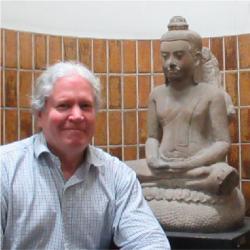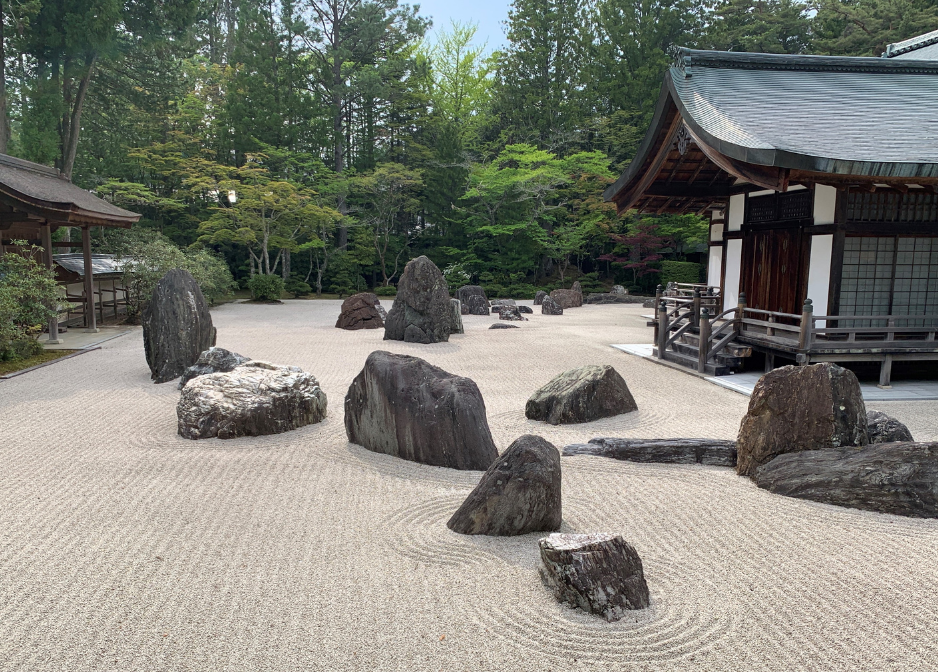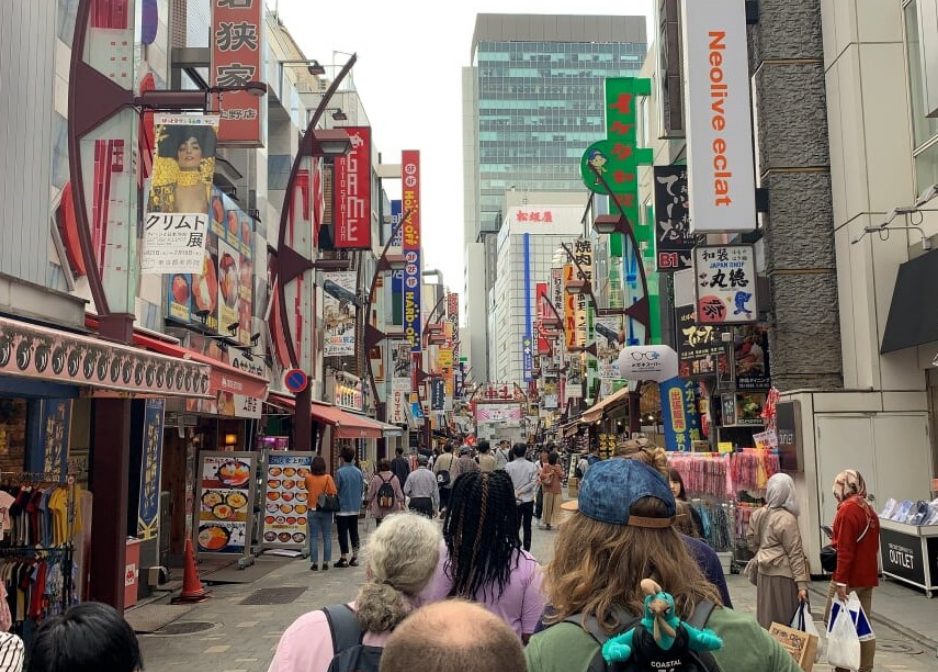Pop Culture Landscapes in Japan: Tokyo, Kyoto, Osaka
Program Details
- Location: Tokyo, Kyoto, and Osaka, Japan
- U.S State Department Travel Information for Japan
- U.S. State Department COVID-19 Information for Japan
- Program Dates: May 9 - June 3, 2022
- Travel Dates: May 9 - May 25, 2022
- Cost: $4311 plus tuition, tech fee, and estimated out-of-pocket expenses
- Online Application
Cultural landscapes are a unique reflection of human interaction with the world around us, and the ways in which we give meaning to places. Exploring cultural landscapes is an important part of understanding aspects of culture and identity. The experience of interacting with those landscapes provides invaluable insight into how such landscapes have shaped Japanese culture and especially its popular culture. Japanese pop culture is known worldwide through a wide range of literature, film, anime, manga, spiritual and religious texts, art, and video games. The cultural landscapes represented in these media are integral parts of the fascination with Japanese pop culture. Having the opportunity to see, hear, explore, and experience the pop culture landscapes that have inspired so many creative works will be a unique opportunity for students to gain deeper insights into the relationships between culture and place.
This faculty-led program offers a collaborative perspective on the unique popular culture of Japan through the experience of historical, spiritual, domestic, and fantastical landscapes in the cities of Tokyo, Kyoto, and Osaka. Together, the group will become immersed in Japanese popular culture through animated films, manga, literature, and video games that display uniquely Japanese themes and cultural touchpoints. The program's courses will pay particular attention to how these themes are evident in the cultural landscapes of the iconic Japanese cities on our itinerary. Daily activities will include a visit to a cultural landscape site and/or museum or other facility, generally followed by a discussion session with the whole group or in individual class groups.
Students will explore the rich histories of Tokyo, Kyoto, and Osaka by taking active part in the specific courses of their interest. Geography and Digital Heritage students will pay particular attention to the physical and cultural elements of the landscape we explore and will capture their experiences and impressions through digital media. Students of Religious Studies will experience the ways that Zen and other types of Japanese Buddhism merge with the naturalistic aesthetics Shintō in the unique and varied landscapes of these three cities.
Course Information
RELIG 104 – Introduction to Asian Religious Traditions
Course Instructor: Dr. Ronald Green
Credits offered: 3
Prerequisite: None
This course provides an introduction to the most prevalent and enduring ideas, images, and personalities of Asian religious traditions including Daoism, Confucianism, East Asian Shamanism, Shinto, and Buddhism. The regions of focus include India, Tibet, China, Korea, and Japan, with some reference to other areas in Asia.
RELIG 491- Japanese Popular Culture: Constructions of Religious and Historical Identity.
Course Instructor: Dr. Ronald Green
Credits offered: 3
Prerequisite: None
This course is a survey of modern popular culture since the Meiji Restoration (1868). It focuses on constructions of identities within historical contexts. Our objective is to analyze ways in which writers and artists have positioned their subjects to re-imagined culture to create particular portrayals. The class examines a section of shosetsu (the Japanese novels) of the Natsume Soseki, Kawabata Yasunari, Msihima Yukio, Murakami Haruki, and Ogawa Yoko, films of Miyazaki Hayao, and important anime. The course promotes critical methodologies and interdisciplinary or comparative studies, combining, for example, literature with fil, visual culture, gender studies, cultural history, Buddhist and Shinto studies and so forth. Students who are encouraged work closely with the instructor and simultaneously with the accompanying professors in other programs and fields to create term papers of presentations. Professors working in digital humanities should be particularly valuable resources.
GEOG 350- Topics in Cultural Landscape Study: Popular Culture Landscapes in Japan
Course Instructor: Dr. Susan Bergeron
Credits offered: 3
Prerequisite: None
A topic-driven course that explores focused research problems within the field of cultural landscape study. Topics can range from general concepts in the interpretation of cultural landscapes to specialized areas on inquiry such as on-site field work to identify and record cultural landscapes, focused study of landscapes from a particular culture or time period, or issues related to cultural landscape preservation. Students will explore each topic in depth through a combination of lectures, discussions, readings, and hands-on projects or research papers.
GEOG 452 Q- Digital Heritage: Virtual Landscapes
Course Instructor: Dr. Susan Bergeron
Course credit: 3
Prerequisite: None
This course introduces students to a variety of digital technologies that can be used to recreate and represent historical and contemporary landscapes as well as to present historical content and scholarly documentations within virtual landscape platforms. The critical visualization of landscapes is a practice of growing importance in the fields of digital and public history, archeology, art and architectural history, cultural geography, and digital heritage. This course section will focus on popular culture landscapes of Japan and will explore specific landscapes though travel to specific sites in Japan as a study abroad educational experience. Students need no prior technical expertise to complete this course and will learn how to digitally record cultural and natural landscape features, process and curate digital data sets, develop digital stories that will explore selected cultural landscapes, and generate virtual landscape features and platforms in software packages such as Unity3D. Students will also work collectively to develop multimedia scholarly content that will document the changing landscapes of a particular place. For the final project, students will develop their own digital stories focused on a selected cultural landscape visited while in Japan as a final project.
Itinerary
For those of you who are just learning about our study abroad program to Japan in Maymester 2022, we’ve created an interactive web presentation that gives more details about our planned stops and itinerary while we’re in Japan. Note that these activities are dependent upon the status of the locations in Japan and may be updated as we get more information, but we will try to keep any changes to a minimum. Follow this link and hit Play to view the presentation.
https://sway.office.com/AidyBV0lyc2DHTGo?ref=Link
Program Leaders
 Ronald Green, Associate Professor of Philosophy and Religious Studies
Ronald Green, Associate Professor of Philosophy and Religious Studies
rgreen@coastal.edu, 843-349-2782
Ron teaches Asian Religions at Coastal. He received a PhD in Languages and Cultures of Asia from the University of Wisconsin-Madison. He has a master’s degree in Japanese Literature. His academic concentration is the history of Japanese Buddhism, particularly Kukai (774-834 CE), who introduced Shingon esoteric Buddhism to Japan. He is also interested in representations of Japanese religions in popular culture mediums such as anime and manga, wrote a book titled Buddhism Goes to the Movies, and has taught courses on this subject. During graduate school, he lived in Japan for a year and attended Meiji University in Tokyo, where all of the classes were conducted in Japanese. Since then, he has spent much time in Japan, including the spring semester of 2018 when he conducted research at the University of Tokyo. He translated numerous Japanese novels and Buddhist texts into English. He also authored a book about the Japanese Shinto religion and has taught a wide range of course on Japan, including Japanese language.
 Susan Bergeron, Associate Professor of Geography
Susan Bergeron, Associate Professor of Geography
sbergero@coastal.edu, 843-349-3496
Susan earned her PhD in Geography from West Virginia University, and holds a M.A. in Geography from West Virginia University, a M.A. in History from Syracuse University, and a B.A. in History from Duke University. Her research interests include virtual heritage, immersive simulation through video game technology and 3D landscape reconstruction, geovisualization, GIScience and the humanities, and geospatial technologies in education. Susan has co-authored book chapters on Geospatial Web and GIS and geovisualization in the humanities. Her research into the development of immersive 3D landscapes as platforms for representing humanities knowledge has focused on the development of Virtual Hampton, an immersive 3D landscape representation of Hampton Plantation, embedded with digital stories of those who lived and worked there. Along with Dr. Ron Green, Dr. Bergeron was recently awarded an ASIANetwork Student-Faculty Fellowship grant to travel to Japan in May 2020 on a research trip with students to begin their fieldwork for the current project in virtual heritage – the Virtual Shikoku Pilgrimage. The ongoing project is involving students in the process of designing and developing an immersive 3D platform to explore the landscape of the Shikoku pilgrimages, and tell the stores of the pilgrims’ experiences, the places they visit, and the impact of the pilgrimages as part of Japan’s cultural heritage.
Cost to Participate = Program Fee ($4,311) + Tuition (Varies) + Technology Fee (Varies) + Out-of-pocket Expenses ($889)
The tuition for this program is for Maymester term.
Included in Program Fee: Roundtrip airfare from U.S. to Japan; accommodations while in country; five group meals and some meals; local transportation; planned excursions; and emergency medical insurance.
Not Included in Program Fee:
- Tuition.
- Estimated out-of-pocket expenses: $444 for meals; $100 for optional excursions and activities; $145 passport cost; and $200 for COVID-19 testing (as required for entry/reentry)
| Discounted Tuition for Education Abroad Students: $416/credit | |||||
|---|---|---|---|---|---|
| CCU credits | Program Fee | Tuition | Technology Fee ($5/credit) |
Out-of-pocket Expenses (estimate) |
Cost to Participate |
| 3 credits | $4311 | $1248 | $15 | $889 | $6463 |
| 6 credits | $4311 | $2496 | $30 | $889 | $7726 |
Payment Schedule
| Payment | Due Date | Amount Due |
| Deposit | Oct. 27, 2021 | $300 (refundable until commitment deadline Dec. 4, 2021) |
| Program Fee Payment | Feb. 11, 2022 | $4011 |
| Tuition and Technology Fee Payment | May 7, 2022 | Varies (see above) |
After acceptance to the program, the payment of the program fee as well as payment of tuition can be made online through WebAdvisor or in-person/by phone through Student Accounts. Tuition charges are distinct and different from program fee charges. Please note that payments made with a debit or credit card will be charged a service fee of 2.7 percent. For more information about methods of payment, visit Student Accounts.
Current Travel Conditions:
- CIA World Factbook Japan
- U.S. State Department Travel Information
- U.S. State Department COVID-19 Information
- CDC Health Information
CCU Travel Resources:
Resources:
- Know Your Travel Risk
- US Embassy Updates – COVID-Related Restrictions on Returning to the USA
- US Embassies – Country Specific COVID-Regulations for Entry and Stay by Country
- U.S. Department of State(DOS)
- Smart Traveler Enrollment Program (state.gov)
- Centers for Disease Control and Prevention(CDC)
- Overseas Security Advisory Council (OSAC)
- International Air Transport Association (IATA)
- Traveler’s Checklist (US Department of State)
- FBI Safety and Security for US Students Traveling Abroad
- World Health Organization (WHO)
- TripPrep






